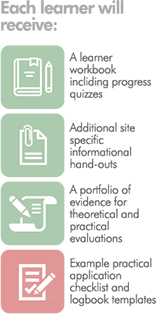 T
This training programme is beneficial to operators who are responsible for transporting both petrol and diesel in the mining and construction sectors, in alignment with legislation, safe mechanical handling and vehicle safety requirements. Our fuel bowser course is designed for novice and experienced learners, providing drivers with the necessary skills and knowledge to operate a fuel bowser safely and efficiently.
Entry requirements
Grade 9 certificate or ABET level 4 is required to attend this course and a code B national driver’s license is mandatory, if operating on South African roads in accordance with The National Road Traffic Act 93 of 1996.
Advanced driver training

Fuel bowser operator training
Off-road vehicles
Course content
Basic mechanical appreciation of fuel bowsers
We outline the fuel bowser’s major components and systems of engine lubrication, cooling, fuel, electrical and hydraulics, the transmission and drive train, etc., and how they all fit into the functioning of the machine.
National Road Traffic Act
We take the learners through fundamental rules, lights, emergency red triangles, the dangers of reckless/negligent/inconsiderate driving, alcohol and drugs, use of roads and freeways, divided roads, general speed limits, passing and overtaking, crossing roads and lanes, hindering traffic flow, traffic lanes, stopping, parking, conveying goods, pedestrians, collisions/accidents, damage to the road, emergency vehicles and general duties of drivers and passengers.
Road traffic signs and markings
Defensive driving – the system of vehicle control
We explain the S I P D E process and application of the system of vehicle control.
Pre-trip inspections
We explain the reasons a driver must prepare the vehicle combination for a trip, preparations for a trip, knowing the vehicle on approach, pre-trip inspection – exterior, pre-trip inspection – interior, starting procedure - manual transmission, shutdown procedure.
Operating the fuel dispensing equipment
We outline the pre-operational safety requirements, operations of the equipment and post-operational shut-downs.
Fuel bowser accident procedures and prevention
What is an accident? How can it be avoided/prevented?
Assessment methods
We conduct a formative theoretical assessment at the beginning of the course to gauge the learner’s initial understanding (novices only). At the end of the training, a summative theoretical and practical application assessment is conducted, to find if the learner is competent; if not, additional developmental areas are identified and suggested.